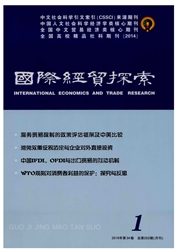

 中文摘要:
中文摘要:
文章使用了1996年-2009年9个欧盟国家的跨国面板数据.在考察居民消费行为基本影响因素的基础上重点研究了政府消费以及民生性财政支出对居民平均消费倾向的影响。结果显示政府消费率的增加显著降低居民平均消费倾向,但是民生性财政支出中医疗支出以及社会保障支出对居民平均消费倾向存在显著的正效应.每增加1个百分点分别会提高居民平均消费倾向0.31和1个百分点.但教育支出的系数为负且不显著。
 英文摘要:
英文摘要:
This paper uses the international panel data of nine EU countries from 1996 to 2009 to mainly study the effect of government consumption expenditure and people's livelihood expenditure on the Average Propensity to Consume (APC) based on the investigation of the basic influencing factors on inhabitant consumer behaviors. The results show that medical expenditure and social security expenditure in people's livelihood expenses have a significantly positive effect on APC, and an increase of 1% in medical expenses and social security expenses will cause an increase of 0.31% and 0.37% to APC respectively, but the coefficient of the proportion of education expenses is negative and insignificant.
 同期刊论文项目
同期刊论文项目
 同项目期刊论文
同项目期刊论文
 期刊信息
期刊信息
